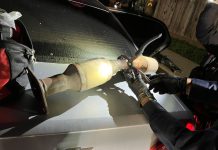Parents who knowingly provide alcohol to minors can be sent to
jail for a year under a new law.
Assembly Bill 1301 went into effect Jan. 1 and aims to reduce
the number of parents or legal guardians who look the other way
when underage kids drink alcohol at home.
Parents who knowingly provide alcohol to minors can be sent to jail for a year under a new law.
Assembly Bill 1301 went into effect Jan. 1 and aims to reduce the number of parents or legal guardians who look the other way when underage kids drink alcohol at home.
Parents now face misdemeanor charges that could send them to jail for a year and make them pay a $1,000 fine.
Although the law is tough on parents, local law enforcement agencies don’t think much will change.
“Personally, I don’t see it changing what we do,” said Officer Terry Mayes, spokesperson for the California Highway Patrol. “It’s difficult to determine where the alcohol came from. You have to prove the parents bought it and provided it knowingly.”
The bill was meant to close a loophole in existing law. Before now, California law prohibited parents from buying or supplying alcohol to minors, but did little to prevent adults from looking the other way when their children drank alcohol at home or threw beer parties.
Parents can be prosecuted under AB 1301 only if they knowingly permit a minor to drink and then drive and only if the youth causes a traffic accident, according to the law.
The most impacted age group are 18 to 21 year olds, Mayes said, because parents don’t think of them as minors anymore.
She also said the most common application of the law will be to keg parties – to purchase a keg, people have to leave a deposit, ID or credit card, all of which are easier to trace.
While obtaining alcohol from a parents’ liquor cabinet is easy, it’s not the most common means of getting a hold of the drug, according to law enforcement officials and parents.
Employing friends who are 21 or the anonymous “shoulder tap” are more frequent, according to Capt. Bob Brooks with the Hollister Police Department. Underage drinking is not supported by most parents, he said.
“I think kids get more sympathy from their friends than their parents,” said Monica Rodriguez, a Hollister parent of teens. “If you listen when kids are talking – when they don’t think you’re listening – they’re usually getting it from somewhere else.”
But there are parents with a different outlook.
“It has been my experience in (parent) alcohol education classes – the parent philosophy is they’d rather have their children drinking at home than drinking and driving. Even with that thinking, you’re still breaking the law,” Mayes said.
While alcohol is said to be easier to get a hold of than other drugs, Brooks said that’s because other drugs aren’t as prevalent in the county and that those drugs are pursued a lot harder – drug charges are felonies while alcohol charges are misdemeanors.
AB 1301 does require a high amount of consumption – a blood-alcohol level of 0.05 – to avoid punishing parents for allowing children to drink small quantities of alcohol as part of a religious ceremony.
Law enforcement officials argue that AB 1301 only adds to previous laws that have the same goal. Just the act of providing alcohol to underage kids is against the law, Mayes said.
“This just makes sure – let there be no mistake, if there’s a reasonable expectation it could happen (teens driving while drunk), then don’t do it,” she said. “If (the parents) didn’t get that deduction before now, they have it in black and white.”








